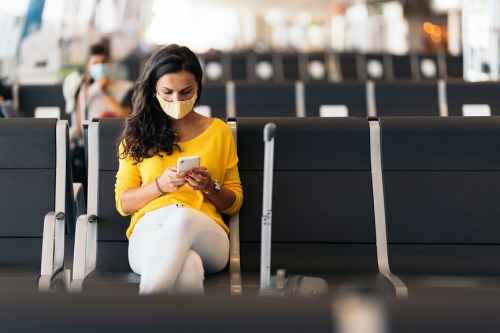Some Airlines Offer COVID-19 Tests Before You Fly—But That Doesn’t Make Your Flight 100% Safe
An infectious disease doctor unpacks the question of whether taking covid-19 tests before travel actually makes your flight more safe.

In the year 2020, responsible travel has taken on a brand-new meaning. Wearing your mask is now even more important than storing your toiletries in a plastic baggie, many destinations are requiring you to quarantine once you land at your hotel, and—increasingly—airlines are recommending requiring passengers to take COVID-19 tests before travel. The question is how effective are these tests at preventing the spread of the virus on the plane and at your chosen destination.
Experts in This Article
infectious disease fellow at Stanford University
Infectious disease specialist Makeda Robinson, MD, says that the efficacy of this approach to travel really depends on how strict airlines are with their policies. Specifically, it matters how soon the test is administered to patients before the flight and what kind of test is administered.
In September, Rome’s Fiumicino International Airport began offering free 30-minute COVID-19 tests for arriving passengers from Spain, Greece, Malta, and Croatia (with plans to roll out the same offering to departing passengers in the future). Both American Airlines and Hawaiian Airlines have announced their intentions to roll out pre-flight tests, with the promise that those with negative test results can skip the otherwise required two-week quarantine in some destinations. In the case of Hawaiian Airlines, passengers will have the option to purchase a $150 drive-through test. And if it comes back negative within 72 hours, they can skip Hawaii’s mandated quarantine. (JetBlue Airlines and United Airlines have plans to institute similar policies as well.)
Dr. Robinson says that while, yes, pre-flight COVID-19 testing is a step in the right direction, these policies still allow a lot of opportunity for infection. Seventy-two hours is a lot of time in which a passenger could be exposed to COVID-19 at the grocery store, gym, or hanging with their quarantine pod, right?
What’s more: Dr. Robinson questions whether more rapid tests would be able to deliver truly accurate results. The polymerase chain reaction tests (PCR) tests that look for the genetic material of the virus and are currently being used at Tampa International Airport don’t offer enough reassurance, she says. “These policies are an interesting approach to improve flight safety and assuage passenger fears about air travel during the COVID-19 pandemic. However, we need to continue to be thoughtful about how we interpret these results,” says Dr. Robinson. “While the majority of PCR tests can accurately determine acute infection, someone very recently exposed may not have a sufficient viral load to be detectable.”
It follows that a program like Italy’s will solve the lag problem, but it won’t necessarily mean that every test provides accurate information. “[P]oint-of-care tests can potentially be less accurate leading to missed or incorrectly diagnosed cases,” says Dr. Robinson. “When you’re thinking about the ideal diagnostic test for air travel you want something with a high sensitivity—meaning, no false negatives—and a fast turn-around time.”
Right now, airlines just haven’t found a way to provide a test that’s both timely and accurate—but they could in the future. For now, travel with caution and know that you are taking a risk.
Sign Up for Our Daily Newsletter
Get all the latest in wellness, trends, food, fitness, beauty, and more delivered right to your inbox.
Got it, you've been added to our email list.








